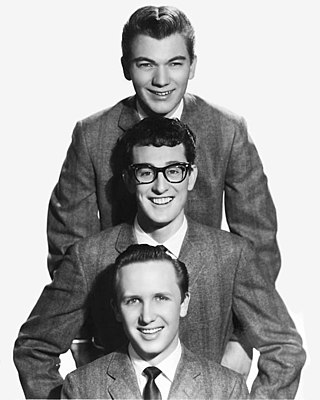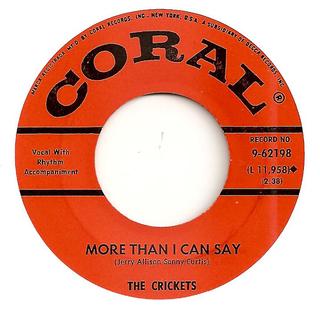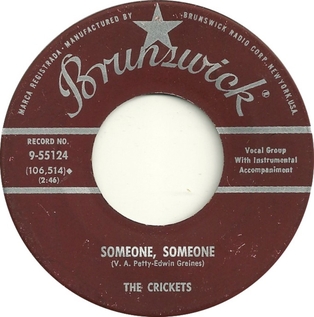
Charles Hardin Holley, known as Buddy Holly, was an American singer and songwriter who was a central and pioneering figure of mid-1950s rock and roll. He was born to a musical family in Lubbock, Texas, during the Great Depression, and learned to play guitar and sing alongside his siblings. Holly's style was influenced by gospel music, country music, and rhythm and blues acts, which he performed in Lubbock with his friends from high school.

The Crickets were an American rock and roll band from Lubbock, Texas, formed by singer-songwriter Buddy Holly in January 1957. Their first hit record, "That'll Be the Day", released in May 1957, peaked at number three on the Billboard Top 100 chart on September 16, 1957. The sleeve of their first album, The "Chirping" Crickets, shows the band line-up at the time: Holly on lead vocals and lead guitar, Niki Sullivan on rhythm guitar, Jerry Allison on drums, and Joe B. Mauldin on bass. The Crickets helped set the template for subsequent rock bands, such as the Beatles, with their guitar-bass-drums line-up, performing their own self-written material. After Holly's death in 1959 the band continued to tour and record into the 1960s and beyond with other band members through to the 21st century.

"That'll Be the Day" is a song written by Buddy Holly and Jerry Allison. It was first recorded by Buddy Holly and the Three Tunes in 1956 and was re-recorded in 1957 by Holly and his new band, the Crickets. The 1957 recording achieved widespread success. Holly's producer, Norman Petty, was credited as a co-writer, although he did not contribute to the composition.
"I Fought the Law" is a song written by Sonny Curtis of the Crickets and popularized by a cover by the Bobby Fuller Four, becoming a top-ten hit for the band in 1966. Their version of the song was ranked No. 175 on the Rolling Stone list of The 500 Greatest Songs of All Time in 2004, and the same year was named one of the 500 "Songs that Shaped Rock" by the Rock and Roll Hall of Fame.

"Not Fade Away" is a song credited to Buddy Holly and Norman Petty and first recorded by Holly and his band, the Crickets.

Jerry Ivan Allison was an American musician. He was best known as the drummer for the Crickets and co-writer of their hits "That'll Be the Day" and "Peggy Sue", recorded with Buddy Holly. His only solo chart entry on the Billboard Hot 100 was "Real Wild Child", issued in 1958 under the name Ivan. Allison was inducted into the Rock and Roll Hall of Fame in 2012.
Sonny Curtis is an American singer and songwriter. Known for his collaborations with Buddy Holly, he was a member of the Crickets and continued with the band after Holly's death. Curtis's best known compositions include "Walk Right Back", a major hit in 1961 for the Everly Brothers; "I Fought the Law", notably covered by the Bobby Fuller Four and the Clash; and "Love is All Around," the theme song for The Mary Tyler Moore Show.
Niki Sullivan was an American rock and roll guitarist, born in South Gate, California. He was one of the three original members of Buddy Holly's backing band, the Crickets. Though he lost interest within a few months of his involvement, his guitar playing was an integral part of Holly's early success. He performed on 27 of the 32 songs Holly and The Crickets recorded over his brief career. He co-wrote a number of his own songs. In 2012, Sullivan was inducted into the Rock and Roll Hall of Fame as a member of the Crickets by a special committee, aimed at correcting the mistake of not including the Crickets with Buddy Holly when he was first inducted in 1986.

"Heartbeat" is a rockabilly song originally recorded by Bob Montgomery and credited to Norman Petty. It was recorded most famously by Buddy Holly in 1958. The B-side of the single was "Well... All Right". "Heartbeat" reached the UK top 10 twice: once in 1975 for Showaddywaddy at number seven and again in 1992 for Nick Berry, recorded as the theme to the television series Heartbeat, which reached number two.

"Oh, Boy!" is a song written by Sonny West, Bill Tilghman and Norman Petty. The song was included on the album The "Chirping" Crickets and was also released as the A-side of a single, with "Not Fade Away" as the B-side. The song peaked at number 10 on the US charts, number 3 on the UK charts in early 1958, and number 26 in Canada.

That'll Be The Day is the second and final studio album from Buddy Holly. Decca, Holly’s first major record label, after failing to produce a hit single from Holly’s early recordings, packaged these 1956 tunes after he had some success with recordings from the Brunswick and Coral labels, especially the previously released single "That'll Be the Day". This is the last album released before his death in a plane crash on February 3, 1959, and is rare among collectors.

"I'm Gonna Love You Too" is a song written by Joe B. Mauldin, Niki Sullivan and Norman Petty, originally recorded by Buddy Holly in 1957 and released as a single in 1958. It was covered 20 years later by American new wave band Blondie and released as the lead single in the U.S. from their multi-platinum 1978 album Parallel Lines.

"Everyday" is a song written by Buddy Holly and Norman Petty, recorded by Buddy Holly and the Crickets on May 29, 1957, and released on September 20, 1957, as the B-side of "Peggy Sue", which went to three on the Billboard Top 100 chart in 1957. The song is ranked number 238 on Rolling Stone magazine's list of the "500 Greatest Songs of All Time".

"More Than I Can Say" is a song written by Sonny Curtis and Jerry Allison, both former members of Buddy Holly's band the Crickets. They recorded it in 1959 soon after Holly's death and released it in 1960. Their original version hit No. 42 on British Record Retailer Chart in 1960. It has been notably performed by singers Bobby Vee and Leo Sayer.

"Love's Made a Fool of You" is a song co-written and originally performed by Buddy Holly. It was later re-recorded by Sonny Curtis and the Crickets, with the lead vocal by Earl Sinks, and famously covered by the Bobby Fuller Four.

In Style With the Crickets is a rock and roll album by the Crickets. Although it was the band's first release following the departure and subsequent death of their front man, Buddy Holly, it still contains many of the band's most memorable songs and many tracks have also been featured on numerous compilations over the years. Originally released as an LP record on December 5, 1960, the album remained out of print for some time until it was re-released on CD in 1993, with bonus tracks not featured on the original album.

Something Old, Something New, Something Blue, Somethin' Else is a rock and roll album by the Crickets. It is The Crickets' third release following the departure and subsequent death of their front man, Buddy Holly. As the original cover indicates, the album contains versions of four old songs, four new songs, and four songs with variations of "blue" in the title.
California Sun / She Loves You is a rock and roll album by the Crickets, recorded during their time with Liberty Records. It is The Crickets' fourth and final album for Liberty following the departure and subsequent death of their front man, Buddy Holly. The album's title is somewhat confusing, as it follows the then-popular industry practice of filling the album cover with the titles of as many popular songs as possible. The record label simply lists "The Crickets" name.

Rockin' 50's Rock'n'Roll is a rock and roll album by the Crickets. It was The Crickets' first release in the 1970s, and marked the band's embrace of their legacy as Buddy Holly's backing band. The album is a concept album of nostalgia for the 1950s, consisting mostly of songs written by Holly and framed by the new retrospectively-minded title track. Originally released as an LP record in December 1970, the album was re-released on CD by in 2000.

"Someone, Someone" is a song by American rock and roll band the Crickets, released in March 1959 as the B-side to "Love's Made a Fool of You". However, the song is better known for the version by British beat group Brian Poole and the Tremeloes, which became a top-ten hit in the UK in 1964.
















